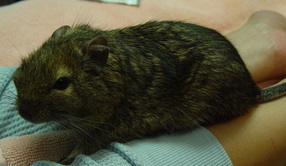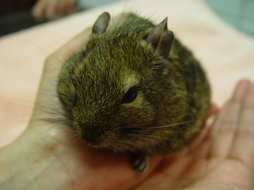Degu Care (Octodon Degus)
by Susan Horton, DVM

Taking Care of your Degu
The degu (Octodon Degus) is native to the western foothills of the Andes . It is the most prolific mammal in Chile , where it is considered an agricultural pest. Since their importation into the US in 1964, degus have become a popular subject of research in the areas of diabetes, cataracts, and circadian behavior. Studies have shown that degus are social, long-lived and have a low incidence of disease, traits that make them outstanding pets.
Classification
Degus are rodents belonging to the suborder Hystricognathi (“porcupine-like rodents’) based upon jaw musculature and skull structure. They belong to the family Octodontidae. Octodon refers to the “figure 8” shape of their cheek teeth. Other names for the degu include brush-tailed rat and trumpet-tailed rat.
Anatomy/Physiology
Degus resemble large gerbils and are dark grayish-brown with a dark brush on the tip of the tail. Their pupils are elliptical. The kidneys produce urine that is normally yellow and thick. Degus are hind-gut fermentors and have a functioning cecum. Their adrenal glands are relatively large. They have five toes on each foot.
Behavior
Degus are diurnal and do not hibernate. They dig elaborate burrows, are highly social and communicate via vocalizations and postures. If degus are not given social interaction and physical stimuli, they may become aggressive or self mutilate. Fighting is rare even when new introductions occur. They enjoy human interaction.
Housing
Degus should be provided with a large cage containing shelves, branches, a running wheel and plenty of room to exercise. Wood shavings, recycled paper products and hay are all suitable bedding materials. A dust bath should be provided as for chinchillas. At least two degus should be housed together.
The degu (Octodon Degus) is native to the western foothills of the Andes . It is the most prolific mammal in Chile , where it is considered an agricultural pest. Since their importation into the US in 1964, degus have become a popular subject of research in the areas of diabetes, cataracts, and circadian behavior. Studies have shown that degus are social, long-lived and have a low incidence of disease, traits that make them outstanding pets.
Classification
Degus are rodents belonging to the suborder Hystricognathi (“porcupine-like rodents’) based upon jaw musculature and skull structure. They belong to the family Octodontidae. Octodon refers to the “figure 8” shape of their cheek teeth. Other names for the degu include brush-tailed rat and trumpet-tailed rat.
Anatomy/Physiology
Degus resemble large gerbils and are dark grayish-brown with a dark brush on the tip of the tail. Their pupils are elliptical. The kidneys produce urine that is normally yellow and thick. Degus are hind-gut fermentors and have a functioning cecum. Their adrenal glands are relatively large. They have five toes on each foot.
Behavior
Degus are diurnal and do not hibernate. They dig elaborate burrows, are highly social and communicate via vocalizations and postures. If degus are not given social interaction and physical stimuli, they may become aggressive or self mutilate. Fighting is rare even when new introductions occur. They enjoy human interaction.
Housing
Degus should be provided with a large cage containing shelves, branches, a running wheel and plenty of room to exercise. Wood shavings, recycled paper products and hay are all suitable bedding materials. A dust bath should be provided as for chinchillas. At least two degus should be housed together.

Diet
Diet in the wild includes a wide variety of plants, roots, seeds, fruit and livestock droppings. A successful captive diet consists of a mixture of rodent blocks and guinea pig chow along with grass hay. Carrots, sweet potatoes, other vegetables, seeds and peanuts are given as treats. Foods containing sugar (e.g., fruits, raisins, breakfast cereal, honey treat sticks) should be avoided. Note that most pelleted feeds contain molasses, which is used as a binder. Starchy foods may also pose a risk.
Annual Checkup
A complete physical examination, review of diet and husbandry and fecal analysis are recommended on an annual basis.
Methods of Restraint
Degus are usually scooped up with two hands. They may be scruffed or held in an encircling grip for examination. Grasping by the tail should be avoided, as tail degloving easily occurs, requiring amputation of the tail. Degus readily learn to step into a net, so this method can also be used.
Breeding
Degus reach puberty at a later age than many rodents. Breeding should begin when the female is 4-9 months of age and body weight is below 250 g. In spite of their long gestation, degus are not born as fully developed as one would expect. The young are born with sparse fur and their eyes open around day 3. Both parents assist with thermoregulation, huddling over the litter to keep them warm. The pups lie on their backs to suckle while the mother lies on top of them. Pups nurse for about 25 minutes. Male degus participate in raising the pups, so the pair must stay together for successful breeding to take place. Infanticide is rare among degus.
Quick Facts for Degu Owners
Vital Statistics
Diet in the wild includes a wide variety of plants, roots, seeds, fruit and livestock droppings. A successful captive diet consists of a mixture of rodent blocks and guinea pig chow along with grass hay. Carrots, sweet potatoes, other vegetables, seeds and peanuts are given as treats. Foods containing sugar (e.g., fruits, raisins, breakfast cereal, honey treat sticks) should be avoided. Note that most pelleted feeds contain molasses, which is used as a binder. Starchy foods may also pose a risk.
Annual Checkup
A complete physical examination, review of diet and husbandry and fecal analysis are recommended on an annual basis.
Methods of Restraint
Degus are usually scooped up with two hands. They may be scruffed or held in an encircling grip for examination. Grasping by the tail should be avoided, as tail degloving easily occurs, requiring amputation of the tail. Degus readily learn to step into a net, so this method can also be used.
Breeding
Degus reach puberty at a later age than many rodents. Breeding should begin when the female is 4-9 months of age and body weight is below 250 g. In spite of their long gestation, degus are not born as fully developed as one would expect. The young are born with sparse fur and their eyes open around day 3. Both parents assist with thermoregulation, huddling over the litter to keep them warm. The pups lie on their backs to suckle while the mother lies on top of them. Pups nurse for about 25 minutes. Male degus participate in raising the pups, so the pair must stay together for successful breeding to take place. Infanticide is rare among degus.
Quick Facts for Degu Owners
- Degus are social animals and enjoy human attention.
- Do not pick your degu up by the tail.
- Limit sugary foods and fruits in the diet.
- Limit fatty foods such as seeds and peanuts.
- Water bottles or sipper tubes should be cleaned often.
- Avoid overheating.
Vital Statistics
|
If you have any questions, please feel free to call us at 847-329-8709.
